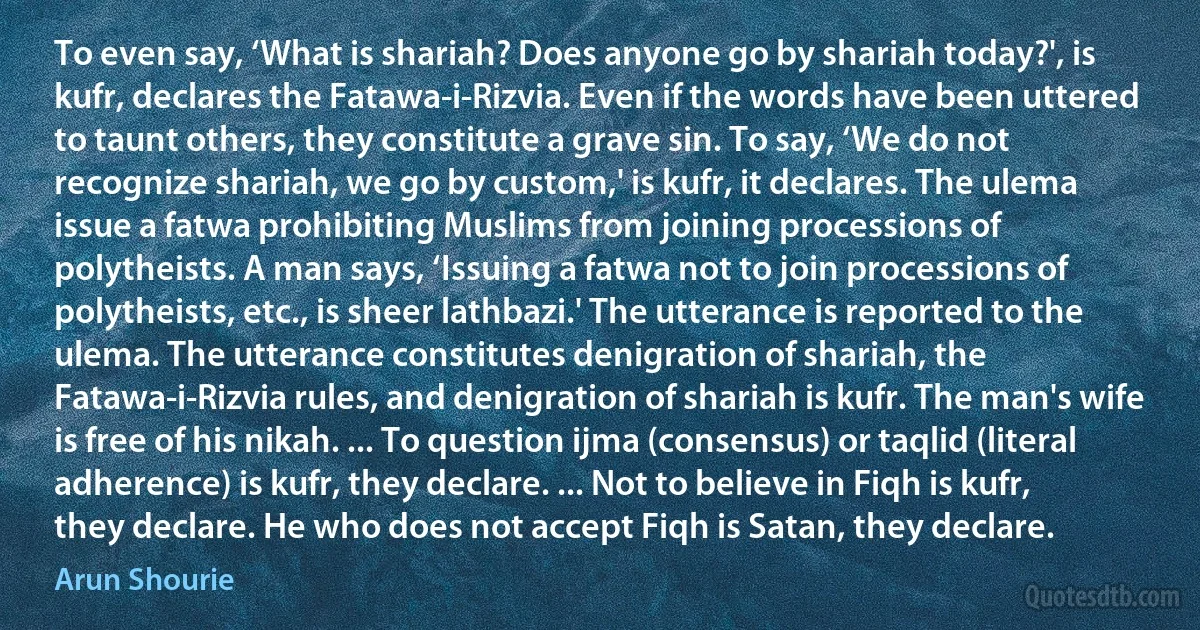
To even say, ‘What is shariah? Does anyone go by shariah today?', is kufr, declares the Fatawa-i-Rizvia. Even if the words have been uttered to taunt others, they constitute a grave sin. To say, ‘We do not recognize shariah, we go by custom,' is kufr, it declares. The ulema issue a fatwa prohibiting Muslims from joining processions of polytheists. A man says, ‘Issuing a fatwa not to join processions of polytheists, etc., is sheer lathbazi.' The utterance is reported to the ulema. The utterance constitutes denigration of shariah, the Fatawa-i-Rizvia rules, and denigration of shariah is kufr. The man's wife is free of his nikah. ... To question ijma (consensus) or taqlid (literal adherence) is kufr, they declare. ... Not to believe in Fiqh is kufr, they declare. He who does not accept Fiqh is Satan, they declare.
Arun ShourieRelated topics
adherence anyone believe consensus custom denigration free grave issuing join literal man question say sin taunt utterance wife etc others today words shariah fatwa RulesRelated quotes
Outside the academic establishment, the "far-reaching change in all our habits of thought” is more serious. It serves to coordinate ideas and goals with those exacted by the prevailing system, to enclose them in the system, and to repel those which are irreconcilable with the system. The reign of such a one-dimensional reality does not mean that materialism rules, and that the spiritual, metaphysical, and bohemian occupations are petering out. On the contrary, there is a great deal of "Worship together this week,” "Why not try God,” Zen, existentialism, and beat ways of life, etc. But such modes of protest and transcendence are no longer contradictory to the status quo and no longer negative. They are rather the ceremonial part of practical behaviorism, its harmless negation, and are quickly digested by the status quo as part of its healthy diet.

Herbert Marcuse
We are not fully human if we live alone. These small acts of compassion-for they can never be organized and institutionalized as can hate-have a power that lives after us. Human kindness is deeply subversive to totalitarian creeds, which seek to thwart all compassion toward those deemed unworthy of moral consideration, those branded as internal or external enemies. These acts recognize and affirm the humanity of others, others who may be condemned as agents of Satan. Those who sacrifice for others, especially at great cost, who place compassion and tolerance above ideology and creeds, and who reject absolutes, especially moral absolutes, stand as constant witnesses in our lives to this love, even long after they are gone. In the gospels this is called resurrection.

Chris Hedges
"In giving freedom to the slave, we assure freedom to the free.” That's what President Lincoln once wrote. "Honorable alike in what we give, and what we preserve. We shall nobly save, or meanly lose, the last best hope of earth.” Mr. Speaker, leaders and members of both parties, distinguished guests: We gather here to commemorate a century and a half of freedom -- not simply for former slaves, but for all of us. Today, the issue of chattel slavery seems so simple, so obvious -- it is wrong in every sense. Stealing men, women, and children from their homelands. Tearing husband from wife, parent from child; stripped and sold to the highest bidder; shackled in chains and bloodied with the whip. It's antithetical not only to our conception of human rights and dignity, but to our conception of ourselves -- a people founded on the premise that all are created equal.

Barack Obama
Women apparently achieve happiness more easily with energetic and virile men, men achieve it more easily with women who are affectionate and willing to be led. Very young women declare that they want to marry men whom they can dominate, but I have never discovered a woman who was truly happy with a man she did not admire for his strength and courage, nor a normal man who was perfectly happy with an Amazon. The fact is that the element of chance in these matters rarely allows a man or a woman to choose a life companion by an act of pure volition, and it is better so; instinct, despite its mistakes, is surer here than intelligence. The question Do I have to fall in love? should not be asked; one must feel the answer to it within oneself. The birth of love, like all other births, is the work of nature.

André Maurois
For what advantage is it, that the world enjoys profound peace, if thou art at war with thyself? This then is the peace we should keep. If we have it, nothing from without will be able to harm us. And to this end the public peace contributes no little: whence it is said, ‘That we may lead a quiet and peaceable life.' But if any one is disturbed when there is quiet, he is a miserable creature. Seest thou that He speaks of this peace which I call the third (inner, ed.) kind? Therefore when he has said, ‘that we may lead a quiet and peaceable life,' he does not stop there, but adds ‘in all godliness and honesty.' But we cannot live in godliness and honesty, unless that peace be established. For when curious reasonings disturb our faith, what peace is there? or when spirits of uncleanness, what peace is there?

John Chrysostom
